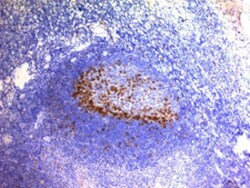Learn More
PDCD1 Mouse anti-Human, Clone: SPM597, Abnova™
Mouse monoclonal antibody raised against full length recombinant human PDCD1.
Supplier: Abnova Corporation MAB13137
Description
This gene encodes a cell surface membrane protein of the immunoglobulin superfamily. This protein is expressed in pro-B-cells and is thought to play a role in their differentiation. In mice, expression of this gene is induced in the thymus when anti-CD3 antibodies are injected and large numbers of thymocytes undergo apoptosis. Mice deficient for this gene bred on a BALB/c background developed dilated cardiomyopathy and died from congestive heart failure. These studies suggest that this gene product may also be important in T cell function and contribute to the prevention of autoimmune diseases. [provided by RefSeq]
Specifications
| PDCD1 | |
| Monoclonal | |
| Unconjugated | |
| Flow Cytometry (0.5-1 ug/106 cells in 0.1 mL) Immunofluorescence (1-2 ug/mL) Immunohistochemistry (Formalin/PFA-fixed paraffin-embedded sections) (0.5-1 ug/mL) The optimal working dilution should be determined by the end user. | |
| CD279/PD1/SLEB2/hPD-1/hPD-l | |
| Mouse | |
| Protein A/G purification | |
| RUO | |
| 5133 | |
| Store at 4°C. | |
| IgG1 κ |
| Flow Cytometry, Immunofluorescence, Immunohistochemistry (PFA fixed) | |
| SPM597 | |
| Mouse monoclonal antibody raised against full length recombinant human PDCD1. | |
| In 10mM PBS (0.05% BSA, 0.05% sodium azide). | |
| PDCD1 | |
| Recombinant protein corresponding to full length human PDCD1. | |
| 100 μg | |
| Primary | |
| Human | |
| Liquid |
Your input is important to us. Please complete this form to provide feedback related to the content on this product.
